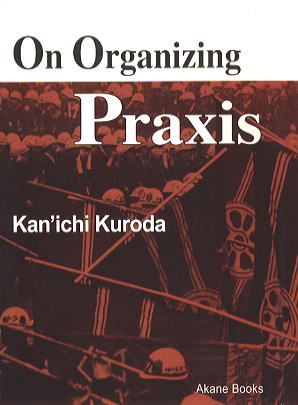Kan'ichi Kuroda
On Organizing Praxis
Distinctive Features of the
Revolutionary Marxist Movement in Postwar
Japan

Translated by Society for the Study of Marx's
Thought
Suggestions on the English text by Andrew
Driver
Published by Kaihoh-sha, 148mm-210mm, hard,
404 pages,
8000 yen, ISBN978-4-89989-059-1.
With Preface by the author written for this volume
Contents
Preface
For a Renaissance of Marxism in the 21st
Century
I. the World at the Opening of the 21st Century
II. The Crisis of Today's Marxism
III. Studies of Marxism in Postwar Japan
1. Philosophy of Subjectivity
2. The Theory of Technics
3. Uno's Tri-stadial Methodology
4. The Theory of Socialist Society
IV. Revolutionary Marxism in Japan
1. My Subjectivity
2. Criticism of Stalinism
3. Taketani's and Uno's Tri-stadial Theories
V. A Perspective of Marxism
1. Main Points of My Works
2. Creation of the Theory of Organizing
Praxis
3. The Resurrection of Marxism
Notes
Fig. 1 Uno's tri-stadial methodology
Fig. 2 Structure of cognition
Fig. 3 Stadial structure of theories
Fig. 4 Contingency theory
I.
Lessons from the Construction of Our Party
1962-68
1. The Struggle to Organize the Revolutionary
Marxist Faction
(November 1962 - July 1963)
2. Internal Struggle for the Formation of
Fractions
(August 1963 - March 1964)
3. The Intensification of the Sino-Soviet
Conflict and Our Internal Struggles
(April 1964 - January 1965)
4. The Advancement of Struggles against the
Vietnam War
(February - August 1965)
5. Defeat in the Struggle against the Japan-ROK
Treaty
(September 1965 - July 1966)
6. The Struggle for Anti-Stalinism under
the Cultural Revolution in China
(August 1966 - march 1967)
7. A New Phase of Antiwar Struggle
(April 1967 - May 1968)
II.
Problems on the Line of Party Building
A. Internal Struggle for Organizing Praxis
B. Inclination towards Emphasis on Ideological
Struggles
C. The Mistaken View of an ‘Organization
as a Unit of Movement’
D. The Break with ‘Organization Building Corresponding to Movement’
III.
Formation of the Vanguard Party
A. Labour-Movementism
B. Establishment of the Organizational Foundation
for Building a Workers' Party
C. The Basic Constitution of the Party Organization
and the Industrial Workers' Committee
D. For the Formation of Our Party Organizations
in Districts
E. Party Cells
IV.
For the Creation of Our Party
1. The Theory of Building the Party Organization―
Its Past and Present
A. The First Stage (January 1957 - August
1959)
B. The Second Stage (September 1959 - August
1961)
C. The Third Stage (September 1961 - March
1963)
2. The Unfolding of the Reality-Theory of
Organizing Praxis
A. The Development and Structure of the Theory
of Revolution in Marxism
The structure of the strategy of "anti-imperialism,
anti-Stalinism" and its necessity
B. Theories of Tactics, Strategy, and Organization
C. Mutual Relationship between the Three
Branches of the Reality-Theory of Organizing
Praxis
3. The Basic Structure of Building Our Party
Organization
A. The Movement-Aspect in Building Our Party
B. The Organization-Aspect in Building Our
Party
C. Logic of Party Building
Fig. 1 One-sided grasp of building a vanguard
organization
Fig. 2 Structure of the Marxist theory
of revolution
Fig. 3 The stadial structure of theories
Fig. 4 Structure of transcendence
Fig. 5 Structure of organizing movement
and building the party organization
Fig. 6 Structure of the relationship between
the organization-aspect and the movement-aspect
Index
|
English home
